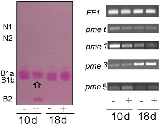
Hypocotyls in heavy metal performance – Cd causes flax cell fattening
Cadmium is a toxic heavy metal that has widespread effects on plant growth, physiology and metabolism. Growth is often reduced and senescence may occur prematurely. Paynel et al., at Rouen (pp. 1363–1372) have shown previously that in flax (Linum usitatissimum) hypocotyls, Cd causes a reduction in cell elongation and an increase in radial expansion, associated with changes in methyl-esterification and cross-linking of the homogalacturonan (HGA) component of pectin. They now discuss the molecular mechanisms that underlie these changes. Flax seeds were germinated and the seedlings grown on in the presence or absence of Cd. The authors examined the effects of the metal on aspects of cell wall physiology in the hypocotyl at 10 and 18 days (under normal growth conditions these mark, respectively, the end of the cell elongation phase and the start of the secondary thickening phase). At both 10 and 18 days there were clear differences in protein profile between the control and Cdtreated hypocotyls. Cd treatment led to a significant increase in pectin methylesterase (PME) activity, especially at 10 days. Much of this increase involved a particular basic PME isoform (B2). Over the same period, there was increased transcription of one of the known flax PME genes, Lupme5, which has already been shown to encode the B2 isoform. These data are thus entirely consistent with the previously observed de-esterification of HGAs in response to Cd. The authors also showed that in the 18-day samples, peroxidase (PER) activity was higher in Cd-treated than in control roots. This enzyme is involved in cell wall stiffening, possibly by cross-linking of the pectins modified by PME and by its involvement in lignification. Again, the increase was ascribed to specific isoforms, Ba and N, regulated by transcription of the genes Flxper1 and Flxper3. The authors suggest that these responses have evolved as a means of immobilizing Cd in the cell wall.
Professor J. A. Bryant
University of Exeter, UK
j.a.bryant{at}exeter.ac.uk